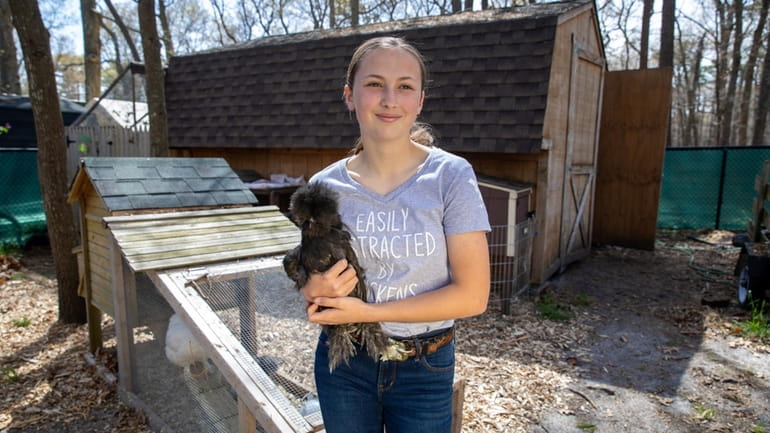For Kaitlyn Eckles, 6 hens a paltry poultry number; Brookhaven considers allowing more

Kaitlyn Eckles, 14, with one of her six chickens in Manorville on Saturday. Credit: Morgan Campbell
Kaitlyn Eckles has a flock of six chickens in her family's Manorville backyard — the start of what the 14-year-old hopes is a burgeoning business selling fresh eggs to her neighbors.
The Eastport-South Manor High School student would like more chickens, reasoning that more birds would mean more “layers,” or more laid eggs. But six is all that Brookhaven Town law will allow.
Six chickens is a pretty paltry number of poultry, she said.
Some Brookhaven officials agree, and they are considering a plan to relax restrictions on raising chickens in residential areas.
Brookhaven Supervisor Dan Panico said officials want to encourage homeowners to keep the fine-feathered fowl — chickens are a relatively cheap source of fresh eggs that also devour ticks, he said.
And they're good for Long Island's trash problem because they eat leftover food, which means less garbage going to incinerators and landfills, he added.
“It’s become increasingly popular, especially post-COVID, and I think we want to take a reasonable approach to what our residents desire, but also take into consideration that backyard chickens are part of an overall, larger solution when it comes to the larger issues of dealing with food waste,” Panico said. “The humble backyard chicken can be part of the solution.”
Brookhaven officials are proposing to double the number of chickens allowed to 12, on properties of 20,001 square feet or more. The limit would remain six for smaller properties.
The town also wants to change its requirement that chicken coops be at least 50 feet from the property line. The new limit would be 10 feet, Panico said.
A public hearing on the proposed changes is scheduled for 5:30 p.m. on June 6.
Roosters would still be banned at households, Panico said, because of their habit of loudly greeting the sunrise.
“People want to live in tranquility and they want to sleep in peace,” he said.
Research has found that chickens are prodigious consumers of leftover food.
A 2019 study by a doctoral student at West Chester University outside Philadelphia found that a single backyard chicken could consume almost 83 pounds of food scraps annually, adding that 24 chickens could eat the equivalent of a ton of household food waste.
The study concluded that domestic chickens “are a highly desirable, cost effective and environmentally positive way to address food waste.”
Kaitlyn Eckles agreed that her chickens help reduce trash at her house by eating leftover cucumber peels, carrots and lettuce.
She started her chicken collection about two years ago when a friend gave her three eggs. “It was a little bit of a COVID project that exploded,” said her mother, Stacy.
“They all have personalities, they have different uses,” Kaitlyn said. “They lay eggs [and] you can sell them.”
Kaitlyn joined the 4-H Club at the Suffolk County Farm and Education Center in Yaphank, where Kate Perz, of the Cornell Cooperative Extension, runs the incubation program and teaches classes on raising chickens.
Perz says she teaches students such tricks as keeping chickens in lighted areas in the winter so they will continue to produce eggs. Hens typically lay an egg every 26 hours, she said.
Chickens eat a wide variety of food, including ticks and other insects, Perz said. Besides acting as composting devices, chickens also are natural fertilizer producers, she added.
And some people think they make great pets, she said.
“A lot of people like having fresh eggs in their backyard,” Perz said. “People who have them as pets really enjoy them.”
Kaitlyn Eckles has a flock of six chickens in her family's Manorville backyard — the start of what the 14-year-old hopes is a burgeoning business selling fresh eggs to her neighbors.
The Eastport-South Manor High School student would like more chickens, reasoning that more birds would mean more “layers,” or more laid eggs. But six is all that Brookhaven Town law will allow.
Six chickens is a pretty paltry number of poultry, she said.
Some Brookhaven officials agree, and they are considering a plan to relax restrictions on raising chickens in residential areas.
Brookhaven Supervisor Dan Panico said officials want to encourage homeowners to keep the fine-feathered fowl — chickens are a relatively cheap source of fresh eggs that also devour ticks, he said.
And they're good for Long Island's trash problem because they eat leftover food, which means less garbage going to incinerators and landfills, he added.
“It’s become increasingly popular, especially post-COVID, and I think we want to take a reasonable approach to what our residents desire, but also take into consideration that backyard chickens are part of an overall, larger solution when it comes to the larger issues of dealing with food waste,” Panico said. “The humble backyard chicken can be part of the solution.”
Brookhaven officials are proposing to double the number of chickens allowed to 12, on properties of 20,001 square feet or more. The limit would remain six for smaller properties.
The town also wants to change its requirement that chicken coops be at least 50 feet from the property line. The new limit would be 10 feet, Panico said.
A public hearing on the proposed changes is scheduled for 5:30 p.m. on June 6.
Noisy roosters not permitted
Roosters would still be banned at households, Panico said, because of their habit of loudly greeting the sunrise.
“People want to live in tranquility and they want to sleep in peace,” he said.
Research has found that chickens are prodigious consumers of leftover food.
A 2019 study by a doctoral student at West Chester University outside Philadelphia found that a single backyard chicken could consume almost 83 pounds of food scraps annually, adding that 24 chickens could eat the equivalent of a ton of household food waste.
The study concluded that domestic chickens “are a highly desirable, cost effective and environmentally positive way to address food waste.”
Kaitlyn Eckles agreed that her chickens help reduce trash at her house by eating leftover cucumber peels, carrots and lettuce.

14-year-old Kaitlyn Eckles wants to expand a business selling fresh eggs to her Manorville neighbors. Credit: Morgan Campbell
Fresh eggs
She started her chicken collection about two years ago when a friend gave her three eggs. “It was a little bit of a COVID project that exploded,” said her mother, Stacy.
“They all have personalities, they have different uses,” Kaitlyn said. “They lay eggs [and] you can sell them.”
Kaitlyn joined the 4-H Club at the Suffolk County Farm and Education Center in Yaphank, where Kate Perz, of the Cornell Cooperative Extension, runs the incubation program and teaches classes on raising chickens.
Perz says she teaches students such tricks as keeping chickens in lighted areas in the winter so they will continue to produce eggs. Hens typically lay an egg every 26 hours, she said.
Chickens eat a wide variety of food, including ticks and other insects, Perz said. Besides acting as composting devices, chickens also are natural fertilizer producers, she added.
And some people think they make great pets, she said.
“A lot of people like having fresh eggs in their backyard,” Perz said. “People who have them as pets really enjoy them.”
Rules on chickens
- Brookhaven Town officials are weighing changes to a town law regulating chickens in residential areas.
- Current law: No more than six chickens per home.
- Proposed: Up to six chickens on parcels measuring 20,000 square feet or less; up to 12 chickens on parcels of 20,001 square feet or more.
- Current law: Chicken coops must be at least 50 feet from property line.
- Proposed: Coops must be at least 10 feet from property line.
SOURCE: Town of Brookhaven

